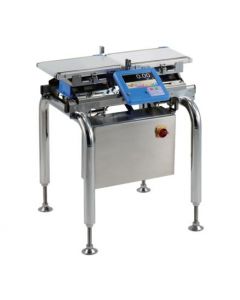In the world of manufacturing and logistics, ensuring accurate weight measurement is crucial. Whether you are a quality control manager, a manufacturer, or part of a logistics company, precision in weighing can directly impact your operations, compliance, and profitability.
Understanding Checkweighers
What Are Checkweighers?
Checkweighers are automated systems designed specifically for the high-speed weighing of products. They are primarily used in production lines to ensure each item falls within a specific weight range. These machines can reject products that do not meet the predetermined criteria, thereby maintaining quality and consistency.
Applications Across Industries
Checkweighers find applications in various industries. In food manufacturing, they ensure every package contains the exact amount of product. In pharmaceuticals, they verify that each pill bottle contains the correct number of tablets. Even in the logistics sector, checkweighers ensure packages meet weight specifications, helping avoid shipping issues and additional costs.
Advantages and Limitations
The primary advantage of checkweighers is their ability to operate at high speeds while maintaining accuracy. This makes them ideal for high-volume production environments. However, they can be costly to implement and maintain. Additionally, their complexity might require specialized training for operators, adding another layer of investment.
Weighing Scales Overview
Types of Weighing Scales
Weighing scales come in various forms, including bench scales, floor scales, and platform scales. Each type serves different purposes. Bench scales are suitable for smaller items, while floor and platform scales can handle larger, bulkier loads.
Role in Quality Control and Logistics
In quality control, weighing scales help ensure that products meet specified weight standards. This is vital for maintaining customer trust and compliance with regulations. In logistics, accurate weighing scales assist in calculating shipping costs and avoiding penalties from carriers for incorrect weight declarations.
Benefits and Challenges
Weighing scales offer versatility and are generally easier to use and maintain than checkweighers. They are also more affordable, making them accessible for smaller businesses. However, they may not provide the same level of automation and speed as checkweighers, which could be a drawback in high-volume environments.
Choosing the Right Solution
Factors to Consider
When deciding between checkweighers and weighing scales, consider factors such as the volume of products, required accuracy, budget, and ease of use. High-volume production lines might benefit more from the speed and automation of checkweighers, while smaller operations could find weighing scales more practical and cost-effective.
Real-World Case Studies
Consider a food manufacturing company that implemented checkweighers to improve its packaging process. The result was a significant reduction in product giveaway and increased compliance with weight regulations. On the other hand, a small logistics firm opted for platform scales to manage its shipments, finding the solution both affordable and efficient for their needs.
Cost-Benefit Analysis
Conducting a cost-benefit analysis can help in making an informed decision. While checkweighers may require a higher upfront investment, their ability to enhance productivity and reduce waste can offer long-term savings. Conversely, weighing scales provide a more straightforward approach with lower initial costs but may require more manual intervention.
Best Practices in Weight Management
Optimizing Use
To get the most out of your weighing equipment, ensure proper placement and routine checks. Regular calibration is essential to maintain accuracy, whether you’re using a checkweigher or a weighing scale. Automation options for scales can also be considered to enhance efficiency.
Importance of Maintenance and Calibration
Maintenance and calibration are non-negotiable aspects of weight management. Regular servicing of equipment prevents breakdowns and ensures consistent performance. For checkweighers, this might include software updates and mechanical part replacements. For weighing scales, periodic calibration and cleaning suffice.
Also Read: The Role of Analytical Balances in Modern Scientific Research
Conclusion
Both checkweighers and weighing scales play pivotal roles in maintaining accuracy and efficiency in various business operations. Checkweighers are perfect for high-speed, high-volume environments requiring automated weight checks, while weighing scales offer a more versatile and cost-effective solution for smaller operations.
Choosing the right equipment depends on your specific business needs, volume of products, and budget. By considering these factors, you can make an informed decision that will enhance your operational efficiency and ensure compliance.

